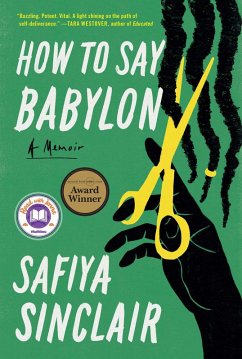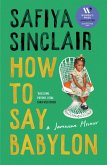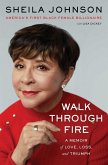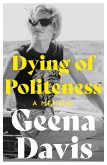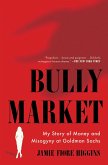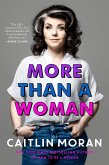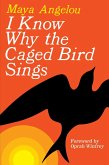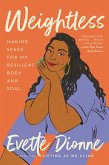National Book Critics Circle Award Winner A New York Times Notable Book A Read with Jenna Today Show Book Club Pick! A Best Book of 2023 by the New York Times, Time, The Washington Post, Vulture, Shelf Awareness, Goodreads, Esquire, The Atlantic, NPR, and Barack Obama With echoes of Educated and Born a Crime, How to Say Babylon is the stunning story of the author's struggle to break free of her rigid Rastafarian upbringing, ruled by her father's strict patriarchal views and repressive control of her childhood, to find her own voice as a woman and poet. Throughout her childhood, Safiya Sinclair's father, a volatile reggae musician and militant adherent to a strict sect of Rastafari, became obsessed with her purity, in particular, with the threat of what Rastas call Babylon, the immoral and corrupting influences of the Western world outside their home. He worried that womanhood would make Safiya and her sisters morally weak and impure, and believed a woman's highest virtue was her obedience. In an effort to keep Babylon outside the gate, he forbade almost everything. In place of pants, the women in her family were made to wear long skirts and dresses to cover their arms and legs, head wraps to cover their hair, no make-up, no jewelry, no opinions, no friends. Safiya's mother, while loyal to her father, nonetheless gave Safiya and her siblings the gift of books, including poetry, to which Safiya latched on for dear life. And as Safiya watched her mother struggle voicelessly for years under housework and the rigidity of her father's beliefs, she increasingly used her education as a sharp tool with which to find her voice and break free. Inevitably, with her rebellion comes clashes with her father, whose rage and paranoia explodes in increasing violence. As Safiya's voice grows, lyrically and poetically, a collision course is set between them. How to Say Babylon is Sinclair's reckoning with the culture that initially nourished but ultimately sought to silence her; it is her reckoning with patriarchy and tradition, and the legacy of colonialism in Jamaica. Rich in lyricism and language only a poet could evoke, How to Say Babylon is both a universal story of a woman finding her own power and a unique glimpse into a rarefied world we may know how to name, Rastafari, but one we know little about.
Dieser Download kann aus rechtlichen Gründen nur mit Rechnungsadresse in A, B, BG, CZ, D, DK, EW, E, FIN, F, GR, HR, H, I, LT, L, LR, NL, PL, P, R, S, SLO, SK ausgeliefert werden.
"Impossible to put down. . .Each lyrical line sings and soars, freeing the reader as it did the writer."-People
"The book grabs the reader because of the beauty of its words, but it sticks because of the thorniness and complexity of its ideas."-The Washington Post
"[A] breathless, scorching memoir of a girlhood spent becoming the perfect Rasta daughter and an adolescence spent becoming one of Jamaica's most promising young poets."-The New York Times
"In this remarkable memoir, Sinclair, an award-winning poet, conjures coming of age in Jamaica with her father, a reggae musician who embraced a strict sect of Rastafari and sought to protect his family from the evil and pervasive influence of the West-what Rastafari call Babylon-and coming into her own as a poet, a writer, and a young woman in charge of her own destiny."-The New Yorker
"This memoir is a melodious wave of memories and interrogations that illustrates Sinclair's skill as both a poet and a storyteller....The magical way she strings sentences together, on its own, is reason enough to indulge in this memoir 10 years in the making.... There were numerous attempts to silence her, but Safiya Sinclair came out on the other side, victorious against patriarchy and colonialization; roaring from the hills like the lioness that she is."-NPR.org
"A courageous memoir of breaking free from a father's oppression - and how poetry can be a salve against chaos....A story about hope, imagination and resilience."-The Guardian
"The strength of Sinclair's memoir lies partly in its refusal to assign simple, individualized meaning to hallmark coming-of-age moments....?How to Say Babylon?also captures remarkable, intensely labored journeys toward forgiveness. Far from being a trite solution to traumas, Sinclair's striking memoir is a testament to her craft and her capacity for self-preservation." -The Atlantic
"Intensely candid, multidimensional, and altogether dazzling."-The Millions
"Sinclair recounts her harrowing upbringing in Jamaica in this bruising memoir.... In dazzling prose ... she examines the traumas of her childhood against the backdrop of her new life as a poet in Babylon.... Readers will be drawn to Sinclair's strength and swept away by her tale of triumph over oppression. This is a tour de force."-Publishers Weekly (starred review)
"Sinclair's gorgeous prose is rife with glimmering details, and the narrative's ending lands as both inevitable and surprising. More than catharsis; this is memoir as liberation."-Kirkus Reviews?(starred review)
"Sinclair's rich, harrowing memoir, "How to Say Babylon," is a story about home and its fragmentation."-LA Times
"Safiya Sinclair knows just how to make a reader feel the intensity of every word on the page."-Shondaland
"A true stand out."-Good Morning America
"I cried so many different kinds of tears reading Safiya Sinclair's How to Say Babylon. In addition to the deep love, courage, intelligence and compassion of her writing, what caused me to well up repeatedly was the understanding that I was in the presence of an enormous soul."-Tracy K. Smith in the New York Times
"The book grabs the reader because of the beauty of its words, but it sticks because of the thorniness and complexity of its ideas."-The Washington Post
"[A] breathless, scorching memoir of a girlhood spent becoming the perfect Rasta daughter and an adolescence spent becoming one of Jamaica's most promising young poets."-The New York Times
"In this remarkable memoir, Sinclair, an award-winning poet, conjures coming of age in Jamaica with her father, a reggae musician who embraced a strict sect of Rastafari and sought to protect his family from the evil and pervasive influence of the West-what Rastafari call Babylon-and coming into her own as a poet, a writer, and a young woman in charge of her own destiny."-The New Yorker
"This memoir is a melodious wave of memories and interrogations that illustrates Sinclair's skill as both a poet and a storyteller....The magical way she strings sentences together, on its own, is reason enough to indulge in this memoir 10 years in the making.... There were numerous attempts to silence her, but Safiya Sinclair came out on the other side, victorious against patriarchy and colonialization; roaring from the hills like the lioness that she is."-NPR.org
"A courageous memoir of breaking free from a father's oppression - and how poetry can be a salve against chaos....A story about hope, imagination and resilience."-The Guardian
"The strength of Sinclair's memoir lies partly in its refusal to assign simple, individualized meaning to hallmark coming-of-age moments....?How to Say Babylon?also captures remarkable, intensely labored journeys toward forgiveness. Far from being a trite solution to traumas, Sinclair's striking memoir is a testament to her craft and her capacity for self-preservation." -The Atlantic
"Intensely candid, multidimensional, and altogether dazzling."-The Millions
"Sinclair recounts her harrowing upbringing in Jamaica in this bruising memoir.... In dazzling prose ... she examines the traumas of her childhood against the backdrop of her new life as a poet in Babylon.... Readers will be drawn to Sinclair's strength and swept away by her tale of triumph over oppression. This is a tour de force."-Publishers Weekly (starred review)
"Sinclair's gorgeous prose is rife with glimmering details, and the narrative's ending lands as both inevitable and surprising. More than catharsis; this is memoir as liberation."-Kirkus Reviews?(starred review)
"Sinclair's rich, harrowing memoir, "How to Say Babylon," is a story about home and its fragmentation."-LA Times
"Safiya Sinclair knows just how to make a reader feel the intensity of every word on the page."-Shondaland
"A true stand out."-Good Morning America
"I cried so many different kinds of tears reading Safiya Sinclair's How to Say Babylon. In addition to the deep love, courage, intelligence and compassion of her writing, what caused me to well up repeatedly was the understanding that I was in the presence of an enormous soul."-Tracy K. Smith in the New York Times

